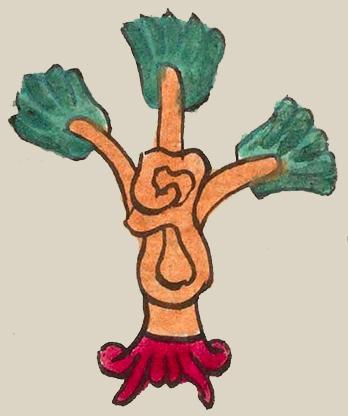Cuauhnacaztlan (Mdz13v)
This compound glyph for the place name Cuauhnacaztlan ("By the Side of the Woods") has two principal elements, a tree (cuahuitl) and an ear (nacaztli) located at the place where the tree's leader and two branches come off the trunk. The tree is generic, with its standard, two-toned green foliage and red, curling roots shown above ground. The trunk and branches are a terracotta color, and the ear is this same color. The ear is a phonetic indicator for the preposition that says "on the side."
Stephanie Wood
Berdan and Anawalt derive their analysis from a reference in Hernández (1959 2:173) to a tree called the quauhnacaztli. If that is the case in the region where this pueblo was located, then it could be the place of cuauhnacaztli trees (which produce a treasured hardwood called guanacaste that is easily worked). Karttunen supports the importance of the guanacaste tree in understanding the place name. Gordon Whittaker, however, proposes that the -nacaz element is not literally about human anatomy, but it is there to provide the figurative meaning, "beside," as in "Beside the Trees." The human ear is associated with being on the side of something. Another very similar locative suffix based on the word for ear is -nacazco, which means "at the side of." The translations are practically the same in meaning. They are phonetic and can only be understood in Nahuatl.
Pedro Carrasco (The Tenochca Empire of Ancient Mexico, 2012, 329) suggests that the contemporary town could be "Guanacastitlan in San Luis Acatlan, Guerrero." Others place the town in the area of Oaxaca.
Stephanie Wood
quauhnacaztlan. puo
Cuauhnacaztlan, pueblo
Stephanie Wood
c. 1541, or by 1553 at the latest
Stephanie Wood
The ear has been fully woven into the trunk of the tree to the point that it was decided to describe the two elements as merged.
trees, ears, guanacastes, orejas, árboles, nombres de lugares

cuahui(tl), tree, https://nahuatl.wired-humanities.org/content/cuahuitl-1
nacaz(tli), ear, https://nahuatl.wired-humanities.org/content/nacaztli
-tlan (locative suffix), https://nahuatl.wired-humanities.org/content/tlan
nacazco, at the side of, https://nahuatl.wired-humanities.org/content/nacazco
nacaztlan, beside, https://nahuatl.wired-humanities.org/content/nacazco
"Cuauhnacaztli Place" [Frances Karttunen, unpublished manuscript, used here with her permission.]
"Beside the Trees" [Gordon Whittaker, Deciphering Aztec Hieroglyphs, 2021, 107]; "Where There Are Many Quauhnacaztli" (Berdan and Anawalt, 1992, vol. 1, 200–201)
CUAUH•NACAZ.
"El Lugar de Guanacastes"
Stephanie Wood
Codex Mendoza, folio 13 verso, https://digital.bodleian.ox.ac.uk/objects/2fea788e-2aa2-4f08-b6d9-648c00..., image 37 of 188.
The Bodleian Libraries, University of Oxford, hold the original manuscript, the MS. Arch. Selden. A. 1. This image is published here under the UK Creative Commons, “Attribution-NonCommercial-ShareAlike 3.0 License” (CC-BY-NC-SA 3.0).




